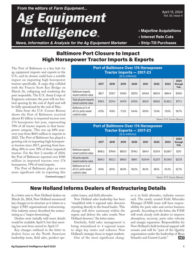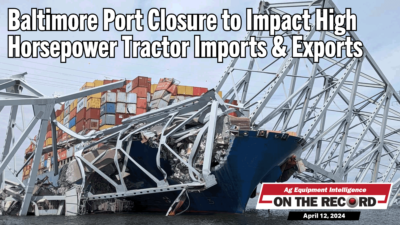
In recent years, the term “blockchain” has become more and more commonplace. It has even found its way into the world of agribusiness and trade. Visionaries hope to use blockchain to make record-keeping of transactions more efficient. However, a few hurdles must be overcome if these goals are to come to full fruition.
What is Blockchain?
The term “blockchain” dates back to as early as 1991 and refers to a technology that stores data. There are singular blocks within a blockchain and each contains data. The beginning block in a chain, sometimes referred to as the “genesis block,” holds data that starts the blockchain and a hash. The hash is a digital signature of sorts that essentially functions as a “thumbprint” unique to that block.
Any following blocks follow a similar yet different composition. The block following the genesis block holds its own data, a hash unique to it and a record of the genesis block’s data. A third block would then have a record of the second block and so on and so forth. This is what creates a blockchain.
Benefitting from Blockchain in Ag
Throughout the agricultural supply chain, there are multiple transactions being conducted. While by no means a cure-all for problems in the supply chain, blockchain could mitigate a few of these issues.
The largest of those issues is the handling of chains of custody. According to CoBank, Tanner Ehmke, manager at Knowledge Exchange, said blockchain could “help facilitate digitally validated chains of custody through choke points like barge and train loading facilities.” Furthermore, Ehmke states that it would “allow buyers and sellers to follow a shipment through various chains of custody.”
Another benefit of using blockchain technology is the digitization of certain aspects of the supply chain. Physical delivery of documents has proven itself to be an inconvenience. Digitizing the process could save money in some areas, most notably the cost of demurrage. If a physical delivery of documents should arrive late, shipments could be delayed and lead to a demurrage charge on an average of $300 per day.
Hurdles Facing Blockchain in Ag
A potential issue is that the use of blockchain may face a lack of interest in certain areas of the ag supply chain. According to Ehmke, “If farmers and country elevators are not incentivized either through cost savings or gain in value, adoption of blockchain will be limited to segments further down the supply chain.”
Another issue facing blockchain is cooperation when it comes to international trade. With the current trade climate being tense with countries like China, cooperation can be hindered.
Ownership of data on the blockchain is another potential problem. The nature of blockchain requires that information to be given for public verification, which might go against the wishes of those involved in the supply chain.
Also worth noting is that blockchain technology would not diminish the need for regulators. To maintain quality information in the blockchain requires some level of regulation in and of itself.
Corporate Interest in Blockchain
Several companies have already begun developing blockchain applications for agriculture around the world. Microsoft’s aim is to help improve the efficiency of Brazil’s agricultural sector. The tech is called “FarmBeats” and it utilizes the blockchain in tandem with artificial intelligence, drones, IoT (Internet of Things) and big data to improve farm productivity. This comes at a time where Brazilian farmers are enduring climate issues and increased demand for their goods.
IBM has already created its own blockchain-based technology for the ag and food industries called “Food Trust,” which is used to create more visibility and accountability throughout the supply chain process. According to IBM, “Food Trust uses a decentralized model to allow multiple participating members of the food supply chain — from growers to suppliers to retailers — to share food origin details, processing data and shipping information on a permissioned blockchain network.”
While there may be issues facing the use of blockchain technology, corporations like Microsoft and IBM are looking to take advantage of the possibilities it brings.
Outlook for Blockchain and Agriculture
To be successful, blockchain will need to bring efficiency and transparency to supply chains in a secure manner that ensures privacy from uninvolved parties; this may lead some to push for an administrative force to regulate who and what can access a particular blockchain, like in India. Communal trust and de-centralized authority, however, are the pillars of blockchain’s efficiency, meaning a shift in perceptions of power would be necessary for its total adoption.
Adoption of blockchain tech is currently limited within the realm of agriculture. However, Ehmke comments that, “Banks and agribusinesses nonetheless remain keen on finding distributed ledger solutions to deploy industry-wide and potentially achieve efficiencies from faster transaction speeds, less cumbersome documentation and simpler and faster payments between buyers and sellers around the world.” As blockchain practices are more widely adopted in agriculture, it will inevitably work its way back to farmers, equipment manufacturers, and dealers, as well as farm input suppliers.




Post a comment
Report Abusive Comment